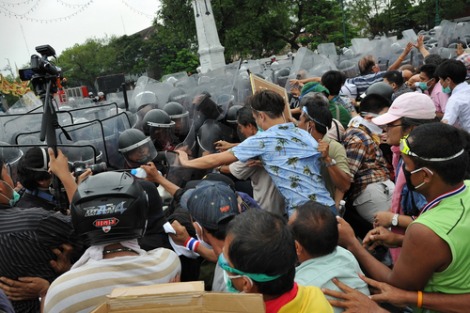 We are witnessing a serious opposition-led threat to democratic process and respect for election results in Thailand, one of Australia's oldest and most important ASEAN trading and political partners.
We are witnessing a serious opposition-led threat to democratic process and respect for election results in Thailand, one of Australia's oldest and most important ASEAN trading and political partners.
Yesterday, pro-government protesters died in street clashes in Bangkok. A former deputy prime minister Suthep Thaugsuban, of the main opposition Democratic Party, who is orchestrating the anti-government protest, told supporters it was necessary for them to break the law in order to try to oust the elected prime minister (who commands a comfortable majority of seats in the elected parliament) Yingluck Shinawatra, younger sister of the controversial exiled Thaksin Shinawatra.
Suthep made a crude public ultimatum when he met Yingluck today: he said this would be his last meeting with her and he demanded she resign within 48 hours.
The highly organised and well equipped Yellow Shirts protesters, several thousands in number, have concentrated on occupying goverment offices and police stations, mainly in Bangkok. Their aim is to disrupt normal government operations. They are claimed to have the sympathy of the urban middle class which objects to Yingluck's populism and her concern for the needs of people in poorer regions of Thailand. They want the money to stay in Bangkok.
This seems to be a minority middle-class revolt against a populist government. Many younger people in Bangkok would quietly favour the elected Yingluck. But their affluent parents in Bangkok seem not to — or at least, are sitting on the fence as thousands of Yellow Shirt protesters rampage through the streets in gas masks.
So far, the Red Shirt supporters of the government have mainly kept off the streets under advice from leaders not to give way to provocations. But how long can this go on?
The Democratic Party strategy is clear, and it has worked in the past: to create so much law and order breakdown as would panic the military and Crown advisers into declaring martial law and suspending democracy for some years. Thailand has had several such periods of enforced military rule precipitated in such ways by minority rightwing demonstrations. It is all sadly familiar.
The King's birthday is on this coming Thursday and it was probably planned that escalating demonstrations this week would increase pressure on the military and Crown advisers to declare martial law before Thursday's celebrations. It is all very clear what is happening.
There has been a strange silence from Thailand's regional friends. It is the ASEAN convention not to comment on internal affairs but that Convention has been broken in the past. One would think that democratic Indonesia, Malaysia and Singapore had views on the street bullying taking place in Thailand now. If so, they have not made their views known to Thailand formally or informally (to judge by media reports).
Nor has Australia. Where was the Dorothy Dix question to Julie Bishop in Parliament? Surely DFAT could have come up with a well-phrased formulation of support for democratic values and due process in Thailand?
Certainly Gareth Evans in his years as Foreign Minister would not have been slow to comment on the present escalating threat to democracy in our friendly neighbour Thailand.
Possibly the Abbott Government is so traumatised as a result of its current tensions with Indonesia and China that it won't dare to open its mouth on Thailand. But this is a clear case where in my view, Australia should comment as a friend of Thailand and of its democratically elected government.
Meanwhile, travel agents continue to advertise holidays in Phuket as if nothing was happening ...
 Tony Kevin is a former ambassador to Cambodia.
Tony Kevin is a former ambassador to Cambodia.
Bangkok protest image from Shutterstock